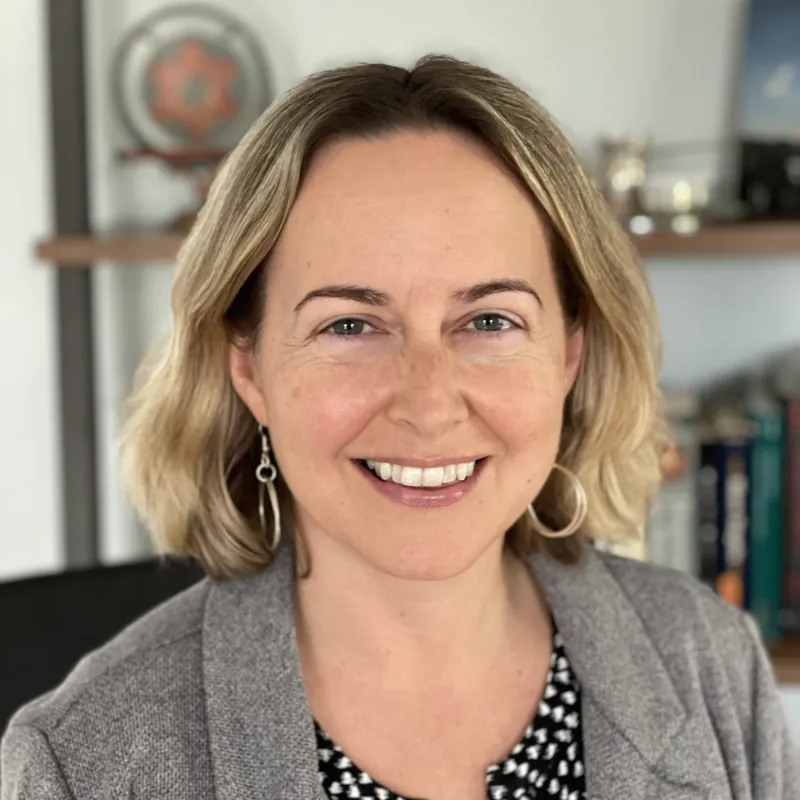Christy Fujio served on the Provide Board of Directors from 2013-2020 and is a member of our GEM (Giving Every Month) circle.
Can you tell me a little about yourself and your background?
From my perspective, abortion and reproductive health are among the most fundamental human rights issues. I’m a human rights lawyer and Executive Director of an NGO called Synergy for Justice. All my work is in the international context, mostly in the Middle East and a lot in Syria, primarily documenting sexual violence and torture for accountability processes. I was really interested in serving on the Provide board because I wanted to do something that contributed to reproductive rights in the United States.
Where do you see reproductive health come up in your human rights work?
Although the contexts are very different, I’ve seen the parallels between my work and the work that Provide does, recognizing the horrible impact that stigma has on the options that people have and the way they access information and services. I see the way that health providers are often blocked, or at least inhibited from providing information because of stigma and /or incorrect assumptions. We work with doctors who come from very conservative communities, and we have worked very hard over the years to remind them that reproductive health is part of overall health—not just part of mom’s health, but it’s part of the whole family’s health and well-being. Like Provide, we have to find different ways to deliver the messages that resonate with people because you don’t see the same recognition of human rights there as we have in other countries.
This is also where our work on stigma comes in. For example, in Syria, if a woman is taken and detained temporarily by the police, everyone assumes she’s been sexually assaulted. If she’s pregnant, she’s already so stigmatized that often she must leave the family and start a new life elsewhere. My organization recently developed a Stigma Justice Toolkit that looks specifically at how stigma related to sexual assault manifests in justice systems. For example, the number of sexual assaults that occur is high, but the number of women who come forward to report it drops dramatically because of the stigma and how horribly they’re going to be treated in the justice system. Then the number of prosecutions is only a small percentage of actual assaults, and the number of convictions even lower. This is a problem, of course, in every country in the world. Our toolkit focuses on different parts of the justice system—the judge, the police investigators, the prosecutors, witness protection—and offers a series of checklists to evaluate these functions and help them do better to eradicate stigma from their system so that sexual assault survivors can come forward and seek justice for what they’ve suffered.
What inspired you to support Provide?
I was living in Massachusetts at the time (I’m now in North Carolina) when I crossed paths with some folks who used to work for Provide who were looking to transform the board into becoming a giving board that was truly invested in the work of Provide. I saw it as a great opportunity, and I really loved being on the board. Honestly, sometimes I feel like I got more out of it than Provide did because I learned so much, not just about the work that Provide does, but about how a small organization runs and how a board can contribute meaningfully without micro-managing. I could see that the leadership was really smart and very deliberate in their interventions. I think that’s something that marks Provide as different than other organizations, and it always has. Everything is well thought out, researched, and reviewed by stakeholders, and that really impressed me from the beginning. I did notice that at that time, however, that no one really seemed to be thinking much about race or racial equity. Jennifer Pepper (now President and CEO of CHOICES) came on board right after I did, and we were both very committed to pushing the leadership on issues of racial equity and to hire more people of color in leadership positions and on the board. I felt very connected to the work and the way Provide continuously transformed.
What keeps you connected to Provide?
The approach that Provide has taken in working with health professionals is very nuanced and unique in this space. I see the way they deal with stigma – not trying to knock people over the head with what’s right, even though we want to do that sometimes – because it’s not effective. I don’t think many organizations are working in that really nuanced way that effectively opens minds or at least avoids making things worse by giving bad information or sending people to pregnancy crisis centers. I know it’s not easy, especially in the states that Provide works in and in this political climate. Combined with the effort to be really inclusive, I see Provide bringing more people who are impacted by these issues into the community, and I really appreciate that. There’s been a big evolution in Provide over the years that I really have loved watching.
How would you describe your role in abortion access?
My current role in abortion access is raising my two sons to understand and support reproductive rights, and by giving monthly to organizations like Provide. I like monthly giving because I don’t have to think or worry about it! I have regularly monthly gifts set up for all the organizations I support, and then sometimes at the end of the year, I’ll make an end of year donation if I can. I know that it’s important for the organization, too, to be able to rely on that consistent support.

Become a GEM today!
To set up your recurring gift, use our secure online giving form or call (617) 661-1161.

